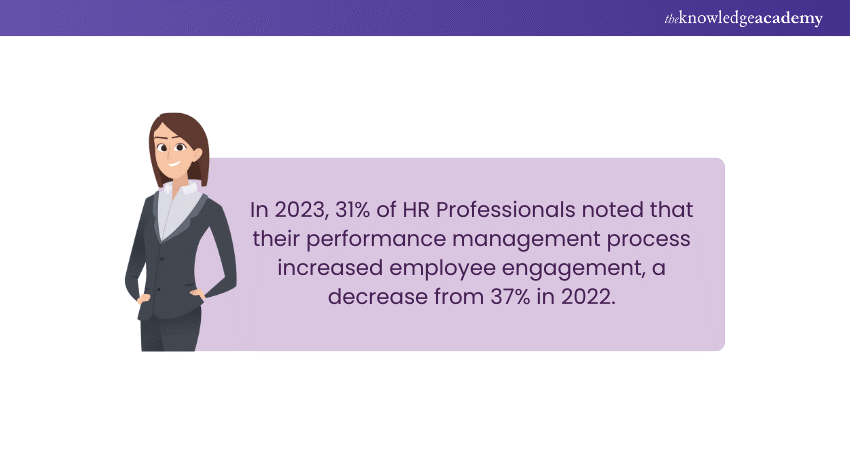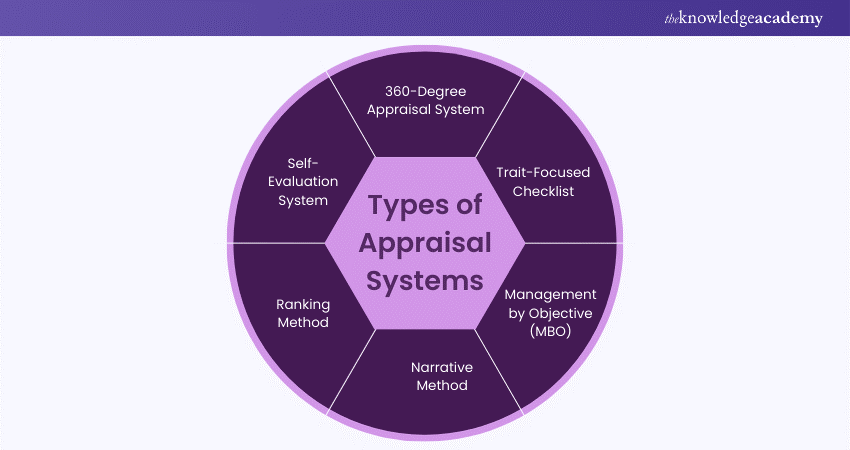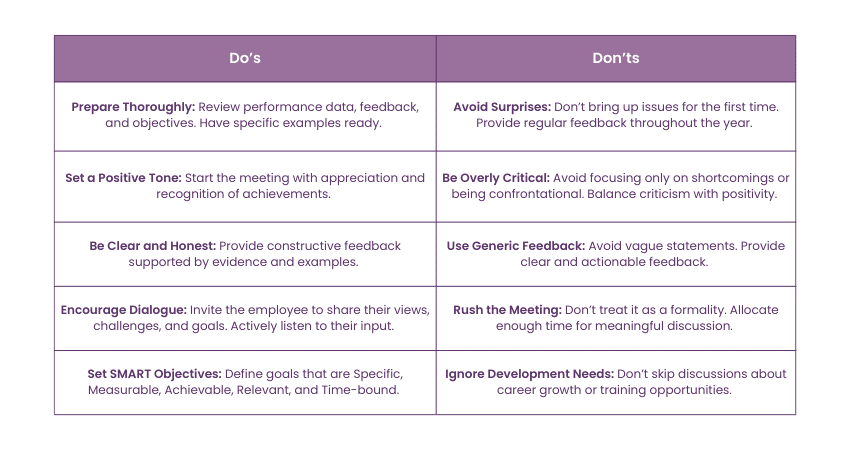We may not have the course you’re looking for. If you enquire or give us a call on +34 932716793 and speak to our training experts, we may still be able to help with your training requirements.
Training Outcomes Within Your Budget!
We ensure quality, budget-alignment, and timely delivery by our expert instructors.

What if your career came with a GPS, showing you the best available route to success? That’s What is an Appraisal —a roadmap highlighting what you’re doing well and where you can do better. Whether you’re hoping for a raise, a promotion, or personal growth, understanding how Appraisals work is a game-changer.
In this blog, we will explore the fundamental question, "What is an Appraisal?". We’ll discuss how they work, why they’re essential, and what makes a good one. To deepen your understanding, we’ll also compare different Appraisals, breaking down the elements of what works and what doesn’t. By the end, you’ll know exactly how to use your next Appraisal to move closer to your career goals.
Table of Contents
1) Understanding What is Appraisal
2) How Do Appraisals Work?
3) Purpose of an Appraisal
4) What Should be Included in an Appraisal?
5) Six Types of Appraisal Systems
6) Limitations of Appraisals
7) Appraisal Meeting Best Practices: 5 Do’s and Don’ts
8) Conclusion
Understanding What is Appraisal
An Appraisal is like having a one-on-one heart-to-heart about your work. It’s a chance to hear what you’re doing well, where you can improve, and how to shape your future. Think of it as a reality check for your career—it helps you see where you stand, boosts your confidence, and shows you how you can grow even more.
Plus, it’s an exciting opportunity to align your personal goals with the company’s vision, giving you a clear and exciting direction for what’s ahead.
Example:
Let’s say you’re a Graphic Designer. In your Appraisal, your manager might say, “Your designs boosted engagement by 20%, which is amazing! But let’s work on speeding up your turnaround time for urgent projects.” It’s a mix of praise and pointers to help you improve.
What Happens During an Appraisal?

Looking Back:
a) How well did you do in your tasks and projects?
b) Did you meet your goals?
Getting Feedback:
a) What’s working in your favour?
b) What needs tweaking?
Planning:
a) What goals should you aim for next?
b) Are there skills you can sharpen to grow further?
Appraisals aren’t just about performance—they’re about finding ways to move forward. Do right; they’re more like career pitstops to refuel and get back on track!
How Do Appraisals Work?
Appraisals are a collaborative process that involves looking back at your performance and planning for the future. It’s not just your manager who evaluates you—it often includes self-assessment and sometimes even Feedback from your peers. The goal? To have an open conversation about where you stand and how you can grow.
Here’s how it typically goes:
Gathering Performance Data:
a) Your manager reviews your work from the past months—projects, goals, and key achievements.
b) Any challenges you face are also noted to help us understand your progress.
Self-Assessment:
a) You reflect on your performance. What went well? What could’ve been better?
b) It’s your chance to share your perspective before the meeting.
The Appraisal Discussion:
a) Sit down with your manager to understand and discuss your work.
b) Reflect on what’s going well with your work and areas where you can grow.
c) Plan the steps you’ll take moving forward.
d) It’s not just about Feedback—work together on a plan for your growth.
Development Planning:
a) You and your manager can outline action steps—training, new responsibilities, or targets to achieve.
b) Think of Appraisals as a two-way street. It’s not just about pointing out what needs to be fixed—it’s about working together to find the best way to achieve success.
Purpose of an Appraisal
Appraisals aren’t just another box for HR to tick—they’re a powerful tool that helps both employees and organisations grow and thrive. Think of them as a checkpoint where you can reflect, realign, and recharge for the future. So, why do companies bother with Appraisals? Let's break it down!
Evaluate Performance Objectively:
a) It gives a clear picture of how well an employee is performing.
b) Identifies strengths, weaknesses, and work habits over time.
Provide Constructive Feedback:
a) Employees get valuable insights into their work and where to improve.
b) It helps clear up misunderstandings and align expectations between employees and managers.
Recognise Achievements and Contributions:
a) Highlights accomplishments, no matter the size.
b) Boosts morale and motivation by celebrating an employee's value to the team.
Align Personal and Organisational Goals:
a) Ensures career goals match the company’s objectives.
b) Creates a sense of purpose and direction for both the employee and the organisation.
Identify Training and Development Needs:
a) Uncovers skill gaps and areas where employees need support or training.
b) It helps organisations invest in tailored learning programs to support employee growth.
Plan for Career Growth:
a) Look beyond current performance to plan for promotions, raises, or new responsibilities.
b) Provides a clear roadmap for employees to advance within the organisation.
By focusing on these areas, Appraisals become a powerful tool for driving individual development, improving team performance, and achieving company goals while fostering a positive and supportive work culture.
Elevate your people strategy—Join our HR Strategy Training today!
What Should Be Included in an Appraisal?
An excellent Appraisal isn’t just about pointing out what’s working or not—it’s about painting a complete picture of an employee’s performance and potential. To make the process meaningful, it should focus on three key areas that help both the employee and the organisation grow. Let's dive in!
1) Performance Evaluation
What’s Working:
a) Highlight specific achievements and successes, such as completed projects or exceeded targets.
b) Celebrate contributions that have positively impacted the team or organisation.
Areas for Improvement:
a) Identify specific aspects where performance needs to be enhanced.
b) Provide actionable Feedback, avoiding vague statements like "improve communication."
Purpose:
It helps employees and managers understand where the employee excels, and adjustments are needed.
2) Assessing Employee Potential
Identifying Growth Opportunities:
a) Assess if the employee is ready for more responsibilities, such as leadership roles or new projects.
b) Recognise skills or qualities that make them a strong candidate for future opportunities.
Building Confidence:
a) Highlighting potential motivates employees and shows them that their efforts are noticed.
b) Encourages them to set higher goals and aim for career advancement.
Purpose:
Demonstrates a clear path for growth and aligns personal aspirations with organisational goals.
3) Identifying Employee Limitations
Pinpointing Weaknesses:
a) Determine areas where the employee is not fulfilling expectations.
b) Use specific examples, such as missed deadlines or gaps in technical knowledge.
Offering Support:
a) Suggest actionable solutions, like training programs, mentoring, or resources to address challenges.
b) Ensure limitations are discussed early through ongoing Feedback to avoid surprises.
Purpose:
Provides clarity on areas for development while offering support to help employees improve.
By focusing on these three areas, Appraisals become constructive, encouraging, and forward-looking, helping employees feel valued and empowered to grow.
Step into strategic leadership—unlock your potential with our Chief Human Resources Officer (CHRO)Training today!
Six Types of Appraisal Systems
Appraisal systems aren’t one-size-fits-all. Each company chooses what works best based on its goals, team dynamics, and organisational culture. Here’s a breakdown of the most commonly used Appraisal systems and how they work:

1) 360-Degree Appraisal System
This system gathers Feedback from all angles—co-workers, managers, subordinates, and even customers.
a) Why It’s Useful: It provides a well-rounded, objective view of an employee’s performance.
b) Consider This: While it’s comprehensive, coordinating Feedback from multiple sources can take time.
2) Trait-Focused Checklist
This system evaluates personal qualities and characteristics, such as punctuality, reliability, and initiative.
a) Why It’s Useful: It’s simple and focuses on core traits that matter in the workplace.
b) Consider This: It can feel subjective and doesn’t measure accomplishments or objectives.
3) Management by Objective (MBO)
This approach assesses performance against specific, pre-agreed goals or objectives.
a) Why It’s Useful: It’s fact-based and measures precisely what’s been achieved.
b) Consider This: Clear goals must be set upfront to be effective and fair.
4) Narrative Method
This involves writing detailed statements about an employee’s qualities, performance, and job approach.
a) Why It’s Useful: It offers rich, personalised Feedback.
b) Consider This: It’s subjective and doesn’t provide measurable or comparable data.
5) Ranking Method
Employees are rated against each other based on performance criteria.
a) Why It’s Useful: It works well in competitive environments like sales or call centres, where targets are clear.
b) Consider This: It’s less formal and may not grasp the full range of an employee’s contributions.
6) Self-Evaluation System
Here, employees assess their performance based on agreed-upon factors.
a) Why It’s Useful: It empowers employees to take ownership of their performance and provides insight into how they view their contributions.
b) Consider This: Self-assessments can be biased, so external input from a manager is often needed to balance the review.
Limitations of Appraisals
Let’s be real—while Appraisals are valuable tools for evaluating performance, they’re not perfect. They come with their own set of challenges that can sometimes make the process less effective.
Limitations of Appraisals
1) Cognitive Biases
Biases can significantly impact the objectivity and fairness of an Appraisal process.
The Halo Effect:
a) Managers focus only on positive traits, overlooking areas where improvement is needed.
b) Example: An employee might have great people skills, but their technical shortcomings are ignored, leading to an incomplete evaluation.
The Horn Effect:
a) Negative traits are overemphasised, overshadowing the employee’s achievements.
b) Example: Missing a deadline might lead a manager to undervalue an employee’s otherwise stellar performance.
Why It’s a Problem: These biases create an unbalanced view, leading to Feedback that’s either overly lenient or excessively critical.
2) Manager Bias
The personal tendencies and relationships of managers can affect the accuracy of Appraisals.
Leniency Bias:
a) Some managers are too lenient, avoiding difficult conversations with underperforming employees to preserve good relationships.
b) This can prevent employees from receiving constructive feedback that could help them improve.
Strictness Bias:
a) Other managers are overly critical, holding employees to unreasonably high standards.
b) High-performing employees might miss out on well-deserved opportunities due to an overly harsh review.
Favouritism:
a) Employees with closer relationships with their managers might receive preferential treatment regardless of performance.
b) This can demotivate team members who feel their efforts aren’t reasonably recognised.
3) Subjectivity in Assessments
Lack of Standardisation:
a) Appraisals can become subjective and vary widely between managers without clear, objective criteria.
b) This inconsistency makes it hard for employees to understand what’s honestly expected of them.
Over-reliance on Personal Opinions:
Narrative statements or qualitative Feedback can be helpful but may reflect personal views rather than measurable performance.
4) Limited Feedback Scope
Overlooking Long-Term Contributions:
Appraisals often focus on recent performance, neglecting an employee’s consistent achievements over time.
Insufficient Employee Input:
If employees aren’t encouraged to share their perspectives, the Appraisal might miss important context about their challenges or successes.
5) Potential for Demotivation
Unbalanced Feedback:
Overly negative reviews can demoralise employees, making them feel undervalued or attacked.
Lack of Growth Opportunities:
Employees might feel stuck in their roles if the Appraisal focuses only on past performance and does not discuss future goals.
How to Address Appraisal Limitations?
To ensure Appraisals are fair and effective, companies can:
1) Train Managers:
a) Teach managers to recognise and manage their biases.
b) Provide training on giving objective and constructive Feedback.
2) Standardise Criteria:
a) Use clear, measurable goals to assess performance consistently.
b) Develop a performance framework that aligns with company values and objectives.
3) Involve Multiple Perspectives:
a) Include peer reviews or 360-degree Feedback for a more balanced view of performance.
b) Gather Feedback from different sources, such as colleagues, subordinates, or clients.
4) Encourage Two-Way Communication:
a) Allow employees to share their input and concerns during the Appraisal process.
b) Create an open and helpful environment for discussion and Feedback.
5) Balance Feedback:
a) Highlight both strengths and areas for improvement.
b) Provide constructive Feedback to motivate employees while fostering growth.
By addressing these challenges head-on, organisations can transform Appraisals into a more constructive and empowering process.
Lead with impact—join our HR Leadership Courses today!
Appraisal Meeting Best Practices: 5 Do’s and Don’ts
Let’s face it—Appraisal meetings can feel like a minefield for managers and employees. But with the right approach, they can become a powerful tool for growth and collaboration. Here are some do’s and don’ts to ensure your Appraisals are fair, effective, and productive:

Conclusion
In conclusion, What is an Appraisal? It’s a vital step in your career development—a chance to reflect on your achievements, receive constructive feedback, and plan for future success. Far from being just a formal evaluation, an appraisal is an opportunity to engage in meaningful dialogue about your potential and career goals. Embrace this process as a moment to shine, refocus, and take deliberate steps toward realising your aspirations.
Transform data into decisions—join our HR Analytics Course now!
Frequently Asked Questions

An appraisal is a structured evaluation process that assesses an individual’s performance, achievements, and areas for improvement. It is typically conducted by a manager or supervisor to guide career development and ensure organisational alignment.

Appraisals are essential for fostering growth and alignment within an organisation. Here are some key reasons why appraisals are necessary:
a) Performance Evaluation
b) Goal Alignment
c) Motivation and Engagement
d) Career Development
e) Improved Communication
f) Decision-making Support

The Knowledge Academy takes global learning to new heights, offering over 30,000 online courses across 490+ locations in 220 countries. This expansive reach ensures accessibility and convenience for learners worldwide.
Alongside our diverse Online Course Catalogue, encompassing 17 major categories, we go the extra mile by providing a plethora of free educational Online Resources like News updates, Blogs, videos, webinars, and interview questions. Tailoring learning experiences further, professionals can maximise value with customisable Course Bundles of TKA.

The Knowledge Academy’s Knowledge Pass, a prepaid voucher, adds another layer of flexibility, allowing course bookings over a 12-month period. Join us on a journey where education knows no bounds.

The Knowledge Academy offers various HR Leadership Courses, including Human Resource Budgeting Training, HR Analytics Course, and HR Strategy Training. These courses cater to different skill levels, providing comprehensive insights into HR Interview Questions.
Our HR Blogs cover a range of topics related to HR, offering valuable resources, best practices, and industry insights. Whether you are a beginner or looking to advance your HR Budgeting skills, The Knowledge Academy's diverse courses and informative blogs have got you covered.
Upcoming HR Resources – Learn about Human Resources Batches & Dates
Date
 Human Resource Budgeting Training
Human Resource Budgeting Training
Fri 14th Feb 2025
Fri 11th Apr 2025
Fri 13th Jun 2025
Fri 15th Aug 2025
Fri 10th Oct 2025
Fri 12th Dec 2025







 Top Rated Course
Top Rated Course



 If you wish to make any changes to your course, please
If you wish to make any changes to your course, please


